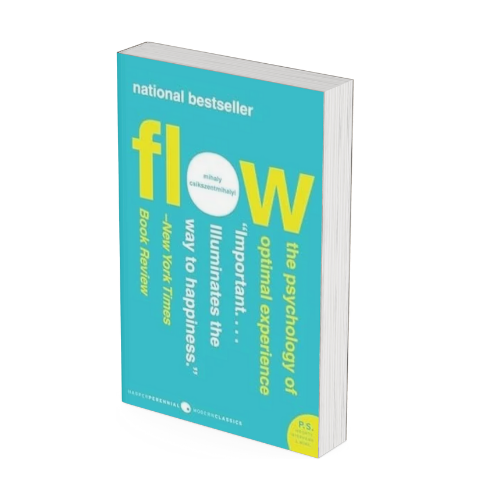Flow: The Psychology of Optimal Experience
by Mihaly Csikszentmihalyi
The Author
Famous for his pioneering work in positive psychology and the concept of “flow,” Mihaly Csikszentmihalyi (1934–2021) wrote extensively on the subject. He dedicated his life’s work to studying how people can reach their potential by creating environments that foster immersion and satisfaction.
As a professor at Claremont Graduate University in California, he influenced psychology, education, and personal development with his groundbreaking books and articles.
Summary of Flow: The Psychology of Optimal Experience
In Flow, Csikszentmihalyi describes being so engrossed in an activity that one loses awareness of time and self-consciousness. This state brings maximum pleasure, creativity, and productivity. He explains how to achieve flow in work, play, art, and routine tasks. Csikszentmihalyi shows how to design life to provide more of these optimal experiences.
The author emphasises that jobs should not be too easy or too hard. Challenges are essential for generating flow. Flow states occur when tasks match and stretch one’s skills. Csikszentmihalyi examines the psychological factors that make specific experiences more meaningful. He highlights the role of focus, intention, and personal growth in achieving flow.
My Thoughts on Flow: The Psychology of Optimal Experience
The way Flow combines philosophy and science resonates with me because it relates so profoundly to real-life experiences. Everyone has felt “flow”—that state of complete immersion where time seems to disappear.
Csikszentmihalyi simplifies this phenomenon, explaining the conditions necessary to cultivate it consciously. He challenges hustle culture by promoting long-term satisfaction over relentless productivity. Instead, his approach encourages self-satisfaction and sustainable growth.
Balance is a central theme in Csikszentmihalyi’s work. He argues that finding flow requires aligning one’s abilities with appropriately challenging tasks. Therapists and coaches can use this insight to guide clients toward fulfilling goals. The goal is to focus attention on tasks that engage without overwhelming.
This concept can transform the lives of those feeling stuck or exhausted. Csikszentmihalyi emphasises that happiness comes from within, not external achievements.
I appreciate how he connects flow to daily life. Flow is not limited to significant moments. Csikszentmihalyi suggests reframing routine tasks as chances to grow. Changing perspectives on “boring” or “ordinary” tasks can relieve anyone feeling trapped in monotony.
Csikszentmihalyi’s research highlights that distractions are the biggest obstacles to flow. Protecting attention is crucial in today’s world of constant technology and social media interruptions. He advocates setting clear boundaries around time and focus. His method challenges us to take responsibility for our mental health by engaging deeply in meaningful pursuits.
Applying Flow to Help Clients and Colleagues
- Achieve balance: Encourage clients to seek challenging yet achievable tasks. Matching abilities with ambitions create the right conditions for flow.
- Practice mindfulness: Help clients reduce anxiety and stay engaged through mindfulness activities focusing on the present moment.
- Minimize distractions: Help clients set boundaries on technology and time to maintain focus and engagement.
- Find joy in routine: Teach clients to reframe mundane tasks as opportunities for learning and growth.
- Develop skills gradually: Help clients build skills step by step to match their challenges, keeping them motivated and engaged.
- Put pleasure first: Guide clients toward activities they love, as flow often stems from inner joy, not external rewards.
- Rethink work: Show clients how work can offer flow through problem-solving and learning opportunities.
- Prioritize autonomy: Motivate clients to take charge of their time and decisions, enhancing their ability to experience flow.
In Summary
Mihaly Csikszentmihalyi’s Flow provides a strong foundation for purposeful, immersive experiences. By learning to enter a flow state, we can shape lives filled with happiness, growth, and productivity. Finding joy in small moments leads to a fuller, more balanced life, and flow is the key to unlocking that fulfillment.
“The greatest glory in living lies not in never falling, but in rising every time we fall.”
Recent Thoughts
When Love Turns to Hate: Why Justice Must Stay in the Courtroom and Not Online
As a therapist working closely with couples and individuals in high-conflict relationships, I have seen the full emotional arc of love, from intimacy
Stress at the Top
Why Leadership in Malta is More Isolated Than You Think We often picture business leaders as confident, driven, and in control. They make




